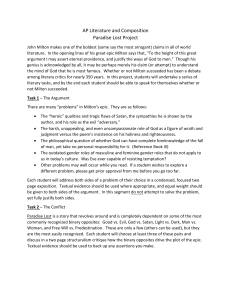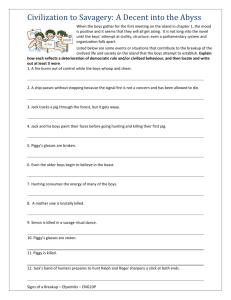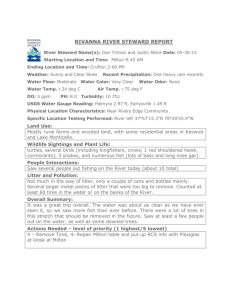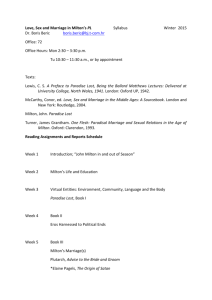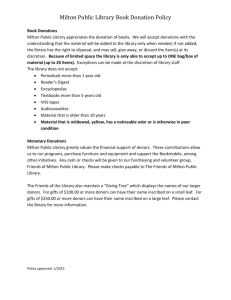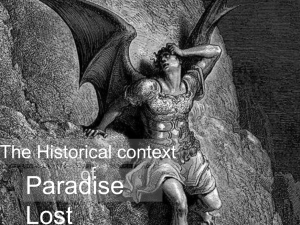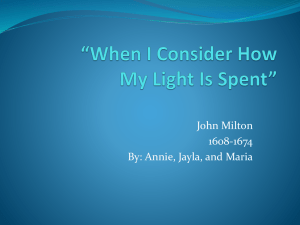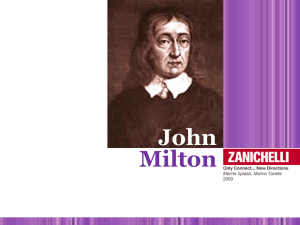Paper Topics - Open Yale Courses
advertisement
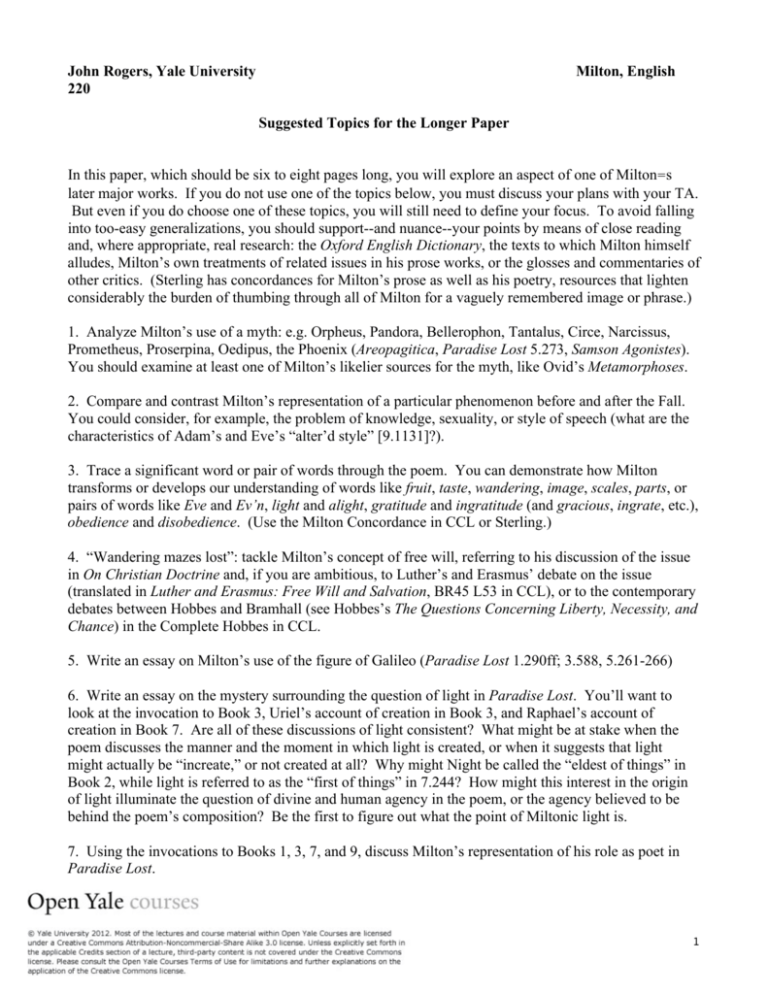
John Rogers, Yale University 220 Milton, English Suggested Topics for the Longer Paper In this paper, which should be six to eight pages long, you will explore an aspect of one of Milton=s later major works. If you do not use one of the topics below, you must discuss your plans with your TA. But even if you do choose one of these topics, you will still need to define your focus. To avoid falling into too-easy generalizations, you should support--and nuance--your points by means of close reading and, where appropriate, real research: the Oxford English Dictionary, the texts to which Milton himself alludes, Milton’s own treatments of related issues in his prose works, or the glosses and commentaries of other critics. (Sterling has concordances for Milton’s prose as well as his poetry, resources that lighten considerably the burden of thumbing through all of Milton for a vaguely remembered image or phrase.) 1. Analyze Milton’s use of a myth: e.g. Orpheus, Pandora, Bellerophon, Tantalus, Circe, Narcissus, Prometheus, Proserpina, Oedipus, the Phoenix (Areopagitica, Paradise Lost 5.273, Samson Agonistes). You should examine at least one of Milton’s likelier sources for the myth, like Ovid’s Metamorphoses. 2. Compare and contrast Milton’s representation of a particular phenomenon before and after the Fall. You could consider, for example, the problem of knowledge, sexuality, or style of speech (what are the characteristics of Adam’s and Eve’s “alter’d style” [9.1131]?). 3. Trace a significant word or pair of words through the poem. You can demonstrate how Milton transforms or develops our understanding of words like fruit, taste, wandering, image, scales, parts, or pairs of words like Eve and Ev’n, light and alight, gratitude and ingratitude (and gracious, ingrate, etc.), obedience and disobedience. (Use the Milton Concordance in CCL or Sterling.) 4. “Wandering mazes lost”: tackle Milton’s concept of free will, referring to his discussion of the issue in On Christian Doctrine and, if you are ambitious, to Luther’s and Erasmus’ debate on the issue (translated in Luther and Erasmus: Free Will and Salvation, BR45 L53 in CCL), or to the contemporary debates between Hobbes and Bramhall (see Hobbes’s The Questions Concerning Liberty, Necessity, and Chance) in the Complete Hobbes in CCL. 5. Write an essay on Milton’s use of the figure of Galileo (Paradise Lost 1.290ff; 3.588, 5.261-266) 6. Write an essay on the mystery surrounding the question of light in Paradise Lost. You’ll want to look at the invocation to Book 3, Uriel’s account of creation in Book 3, and Raphael’s account of creation in Book 7. Are all of these discussions of light consistent? What might be at stake when the poem discusses the manner and the moment in which light is created, or when it suggests that light might actually be “increate,” or not created at all? Why might Night be called the “eldest of things” in Book 2, while light is referred to as the “first of things” in 7.244? How might this interest in the origin of light illuminate the question of divine and human agency in the poem, or the agency believed to be behind the poem’s composition? Be the first to figure out what the point of Miltonic light is. 7. Using the invocations to Books 1, 3, 7, and 9, discuss Milton’s representation of his role as poet in Paradise Lost. 1 8. Compare the different versions of any one particular story told in Paradise Lost, e.g. the war in heaven, the creation of Eve (4.449-92; 8.452-99), the creation of the world (Uriel’s account in 3.708-21, and Raphael’s in 7.210ff); Satan’s revolt; the expulsion of the rebel angels (Satan’s account in 1.169-77, Chaos’s account in 2.992-1006, the narrator’s in 3.390-99, and Raphael’s in 7.856-80); the building of the bridge from earth to hell (2.1023-1033 and 10.271-324). How do the different versions vary? Why? What influence does the teller have on our responses? 9. Is the war in heaven comic? Why does God allow it to be waged? What educational purpose does Raphael’s account of the war in heaven serve? 10. What does Milton add to the account of creation in Genesis? Do you see any significant patterns and themes to Milton’s additions to the Bible? Look at Book One of Ovid’s Metamorphoses, or Book Five, lines 419ff. of Lucretius’s De Rerum Natura (Of the Nature of Things), as possible sources for Milton’s creation account. You might also compare Uriel’s brief account of the creation in Book Three with Raphael’s much more elaborate one in Book Seven. 11. How does Milton suggest the difficulty of describing creation from a fallen perspective? Look especially at 7.300-306; 7.387-414; 7.438-46; 7.494-99. 12. Analyze something in Paradise Lost, Paradise Regained, or Samson Agonistes which expands on or revises one of Milton’s previous works. (If you choose Comus and the Paradise Lost Satan or the Paradise Regained Satan, or the Lady and Eve, or Eve and Dalila, you’d need to focus your topic carefully.) Other possibilities: Sonnet 19, and the Invocation to Book III; “At a Solemn Music” and any number of music passages in Paradise Lost; the figure of the guide in Areopagitica and Paradise Lost; the theme of blindness in The Second Defense, Paradise Lost, or Samson Agonistes; the phrase “yet once more” in “Lycidas” and in Paradise Lost; the discussion of marriage in Paradise Lost or Samson Agonistes and the Doctrine and Discipline of Divorce. 13. The Nativity stories of Eve and/or Adam. How might these stories delineate a theory of selfconsciousness? If you focus on Eve’s story, you might want to look at Ovid’s story of Narcissus and Echo in Metamorphoses III, or Freud’s essay “On Narcissism: An Introduction” (in Volume 14 of the Standard Edition of Freud’s works, CCL BF173 F63 A135, 1953, 14). 14. Milton’s views on heroism, Hebrew, Christian, or pagan. For Paradise Lost, the invocation to Book IX would be a good place to begin--as would the sonnet “When I Consider.” Book III of Paradise Regained and all of Samson Agonistes provide even more complex and fascinating discussions of the value and meaning of human action. 15. Analyze Milton’s revisionary treatment of a biblical, classical, or English text: e.g. Genesis I and Paradise Lost 7; Ovid’s Metamorphoses I and Paradise Lost 7; Spenser’s Cave of Mammon (Faerie Queene II.vii) and Milton’s hell, Areopagitica, and Paradise Regained; Spenser’s Bower of Bliss (and/or Garden of Adonis) and Milton’s pre- or post-lapsarian paradise; Spenser’s Errour and Milton’s Sin; Virgil’s Turnus and Milton’s Satan (look especially at the end of Book IV, which echoes the end of the Aeneid); Shakespeare’s Richard III (“Now is the winter of our discontent”) and Satan on Mt. Niphates; Adam in Paradise Lost 10 and Hamlet (“To be or not to be”); the openings of Samson Agonistes and Sophocles’ Oedipus at Colonus; the banquet scene in Paradise Regained and the banquet scenes in Marlowe’s Dr. Faustus, and Shakespeare’s The Tempest. 2
